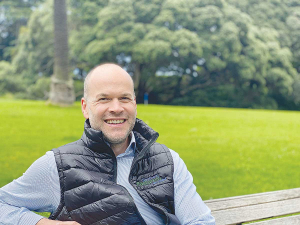Indian FTA 'opens doors for dairy'
A New Zealand dairy industry leader believes the free trade deal announced with India delivers wins for the sector.
 Southern Pastures' Tom Bailey says consumers are flocking back to dairy products as Covid shines the light on health and wellness.
Southern Pastures' Tom Bailey says consumers are flocking back to dairy products as Covid shines the light on health and wellness.
Consumers are flocking back to dairy products as Covid shines the light on health and wellness, says Tom Bailey, the new senior vice president for Southern Pastures.
Bailey, who took up his new role in Auckland after working as a senior dairy analyst for RaboResearch in the US, told Rural News that dairy demand has come roaring back as people seek natural nutrition and go back to basics – simple, uncomplicated, familiar and trusted food.
“Covid has emphasised health and wellness from many angles and demand for milk is back,” he says.
“There are specific examples of this on a national scale; the US has bought massive amounts of dairy as part of its food support programs,” he says.
“Chinese demand has also been very strong. The government has emphasised the health benefits of milk, and we are hearing that fluid milk demand is pumping.”
As a result, the Chinese dairy processors do not have excess milk, which they normally would, because fluid milk demand has been so strong.
This has helped bolster NZ exports as our exports meet growing demand and also backfill where domestic Chinese manufacturers are missing.
Bailey also says NZ ingredients remain at a substantial premium relative to the global markets, due to many factors – grass-fed is better, many brands require Fonterra specifications for label requirements, and NZ has a great working relationship with key importing markets, such as China.
Southern Pastures owns and operates 20 farms in Waikato and Canterbury and also owns boutique milk company Lewis Road Creamery. The company milks cows under a stringent independently certified 10 Star certified values program, which stipulates grass-fed, free-range, climate-change mitigation, human welfare, animal welfare, GMO-free, palm products free, growth hormones free, antibiotic stewardship, and environmental sustainability requirements.
Premium milk produced under the Southern Pastures 10 Star program is currently used in Lewis Road Creamery’s grass-fed butter sold in Whole Foods and other stores across the US.
Bailey believes value-add dairy products of the type produced by Southern Pastures and Lewis Road are poised for significant global growth.
“We’ve seen a back-to-basics trend for some time now, with consumers seeking out high quality, nutritious dairy options over more expensive and less healthful alternative plant-based products,” he says.
“People are showing a clear preference for more natural, less adulterated foods with shorter ingredient lists.”
He said premium markets will increasingly pay more for dairy that has an authentic and traceable story.
“When you add attributes such as sustainability or more favourable omega 3:6 milk fat ratios you can extend your market lead, and that’s where Southern Pastures really stands out.”
Lost Opportunity
New Zealand milk volume is surprisingly declining in a highly profitable environment.
Tom Bailey believes this is due to legislative uncertainty around environmental regulations and central bank policies creating reluctance to invest in dairy.
“This is affecting banks’ willingness to lend as well as farmer ability to expand. This is a lost opportunity for the economy,” he says.
While NZ supply set for further possible declines, Bailey believes NZ premium are well positioned to be maintained relative to other global dairy export markets.
“Furthermore, consumers continue to show a lot of love for grass-fed products,” he told Rural News.
“Because grazing is amazing and NZ dairies are the most productive with the smallest environmental footprint in the world, NZ products should sell well.
“There is no doubt that premium consumers want our products – our Lewis Road brand has had fantastic traction in the US, and we are set to launch on Amazon, making us the first NZ butter brand store on Amazon.”
Donald Trump's latest tariff tantrum has again thrown the world of trade into a new round of turmoil and uncertainty, and NZ is caught up in it.
The third edition of the NZ Dairy Expo, held in mid-February in Matamata, has shown that the KISS principle (keep it simple stupid) was getting a positive response from exhibitors and visitors alike.
Twenty years ago, South African dairy farm manager Louis Vandenberg was sent to a farm in Waikato to provide training on Afimilk technology.
Strong farmgate milk price is helping boost investment on farms, says PGG Wrightson chief executive Stephen Guerin.
Fonterra's 460 milk suppliers in Australia, who will switch to Lactalis end of this month, are unfazed with the impending change.
The 5+ A Day Charitable Trust has launched a collection of affordable recipes designed to turn everyday vegetables into seasonal stars.

OPINION: A mate of yours truly reckons rural Manawatu families are the latest to suffer under what he calls the…
OPINION: If old Winston Peters thinks building trade relations with new nations, such as India, isn't a necessary investment in…